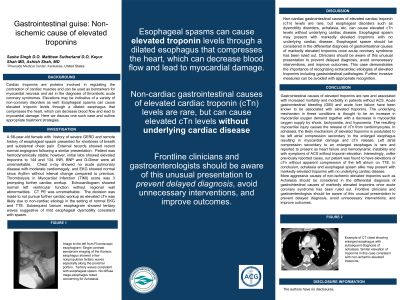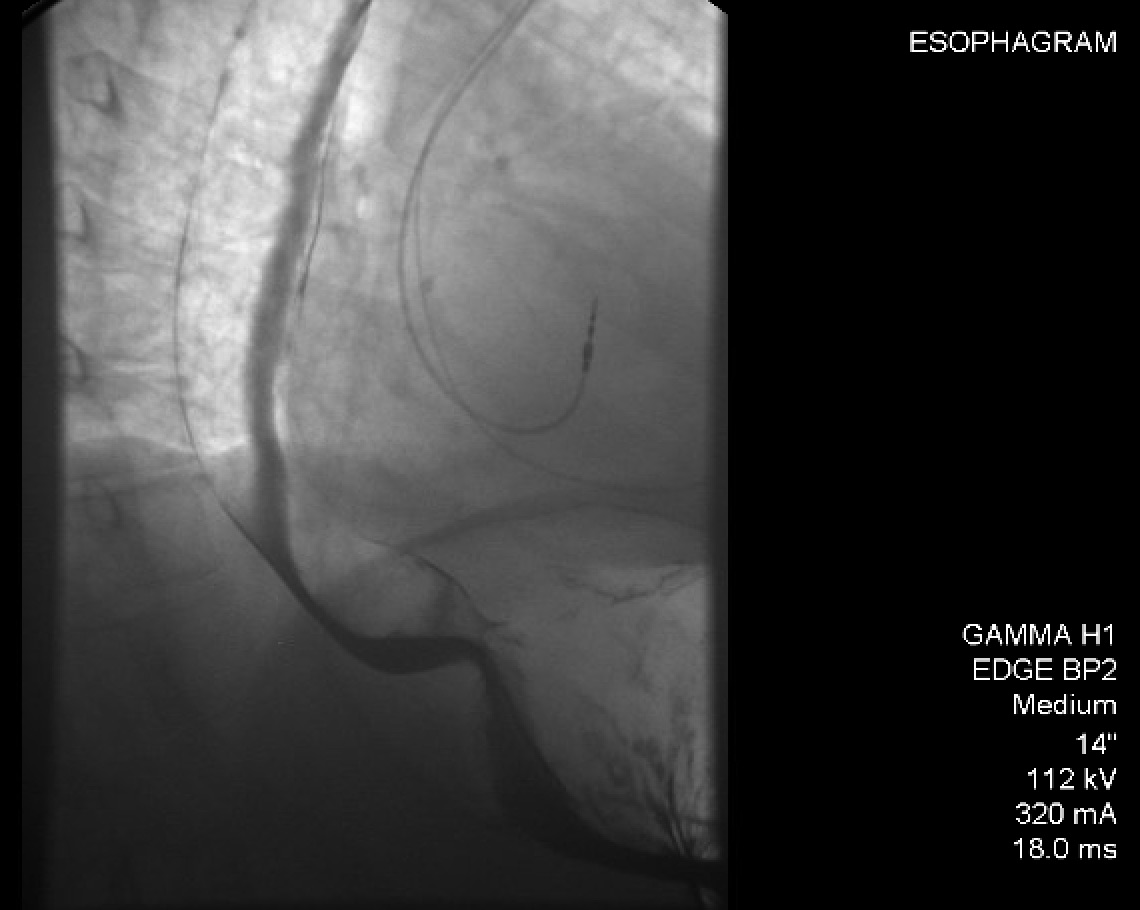Sunday Poster Session
Category: Esophagus
P0592 - Gastrointestinal Guise: Non-Ischemic Cause of Elevated Troponins
Sunday, October 27, 2024
3:30 PM - 7:00 PM ET
Location: Exhibit Hall E

Has Audio
- SS
Sasha Singh, DO
Riverside Medical Center
Bourbonnais, IL
Presenting Author(s)
Sasha Singh, DO1, Matthew Sutherland, DO2, Nishita Vattem, DO1, Ashish Shah, MD2, Keyur Shah, MD2
1Riverside Medical Center, Bourbonnais, IL; 2Riverside Medical Center, Kankakee, IL
Introduction: Cardiac troponins are proteins involved in regulating the contraction of cardiac muscles and can be used as biomarkers for myocardial necrosis and aid in the diagnosis of thrombotic acute coronary syndromes. Elevations may be indicative of a variety of non-coronary disorders as well. Esophageal spasms can cause elevated troponin levels through a dilated esophagus that compresses the heart, which can decrease blood flow and lead to myocardial damage. Here we discuss one such case and outline appropriate treatment strategies.
Case Description/Methods: A 68-year-old female with remote history of esophageal spasm presented for shortness of breath and substernal chest pain. External records showed recent normal angiogram following a similar presentation. Patient was hemodynamically stable; however,initial labs showed elevated troponins to 144 and 134. INR, BNP and D-Dimer were all unremarkable. Chest x-ray showed no acute pulmonary disease with moderate cardiomegaly, and EKG showed normal sinus rhythm without interval change compared to previous. Thrombolysis in Myocardial Infarction (TIMI) score was 3 prompting further cardiac workup. Echocardiogram showed normal left ventricular function without regional wall abnormalities. CT PE was unremarkable. The decision was made to not pursue further cardiac workup as elevated cTn was likely due to non-cardiac etiology in the setting of normal EKG and TTE. Subsequent barium esophagram showed tertiary waves suggestive of mild esophageal dysmotility consistent with spasm.
Discussion: Non-cardiac gastrointestinal causes of elevated cardiac troponin (cTn) levels are rare, but esophageal disorders such as dysmotility disorders, achalasia, etc. can cause elevated cTn levels without underlying cardiac disease. Esophageal spasm may present with markedly elevated troponins with no underlying cardiac disease. Esophageal spasm should be considered in the differential diagnosis of gastrointestinal causes of markedly elevated troponins once acute coronary syndrome has been ruled out. Clinicians should be aware of this unusual presentation to prevent delayed diagnosis, avoid unnecessary interventions, and improve outcomes. This case demonstrates the importance of recognising extracardiac etiologies of elevated troponins including gastrointestinal pathologies. Further invasive measures can be avoided with appropriate recognition.

Disclosures:
Sasha Singh, DO1, Matthew Sutherland, DO2, Nishita Vattem, DO1, Ashish Shah, MD2, Keyur Shah, MD2. P0592 - Gastrointestinal Guise: Non-Ischemic Cause of Elevated Troponins, ACG 2024 Annual Scientific Meeting Abstracts. Philadelphia, PA: American College of Gastroenterology.
1Riverside Medical Center, Bourbonnais, IL; 2Riverside Medical Center, Kankakee, IL
Introduction: Cardiac troponins are proteins involved in regulating the contraction of cardiac muscles and can be used as biomarkers for myocardial necrosis and aid in the diagnosis of thrombotic acute coronary syndromes. Elevations may be indicative of a variety of non-coronary disorders as well. Esophageal spasms can cause elevated troponin levels through a dilated esophagus that compresses the heart, which can decrease blood flow and lead to myocardial damage. Here we discuss one such case and outline appropriate treatment strategies.
Case Description/Methods: A 68-year-old female with remote history of esophageal spasm presented for shortness of breath and substernal chest pain. External records showed recent normal angiogram following a similar presentation. Patient was hemodynamically stable; however,initial labs showed elevated troponins to 144 and 134. INR, BNP and D-Dimer were all unremarkable. Chest x-ray showed no acute pulmonary disease with moderate cardiomegaly, and EKG showed normal sinus rhythm without interval change compared to previous. Thrombolysis in Myocardial Infarction (TIMI) score was 3 prompting further cardiac workup. Echocardiogram showed normal left ventricular function without regional wall abnormalities. CT PE was unremarkable. The decision was made to not pursue further cardiac workup as elevated cTn was likely due to non-cardiac etiology in the setting of normal EKG and TTE. Subsequent barium esophagram showed tertiary waves suggestive of mild esophageal dysmotility consistent with spasm.
Discussion: Non-cardiac gastrointestinal causes of elevated cardiac troponin (cTn) levels are rare, but esophageal disorders such as dysmotility disorders, achalasia, etc. can cause elevated cTn levels without underlying cardiac disease. Esophageal spasm may present with markedly elevated troponins with no underlying cardiac disease. Esophageal spasm should be considered in the differential diagnosis of gastrointestinal causes of markedly elevated troponins once acute coronary syndrome has been ruled out. Clinicians should be aware of this unusual presentation to prevent delayed diagnosis, avoid unnecessary interventions, and improve outcomes. This case demonstrates the importance of recognising extracardiac etiologies of elevated troponins including gastrointestinal pathologies. Further invasive measures can be avoided with appropriate recognition.

Figure: Tertiary waves noted on stationary image of esophogram indicating dysmotility/spasm.
Disclosures:
Sasha Singh indicated no relevant financial relationships.
Matthew Sutherland indicated no relevant financial relationships.
Nishita Vattem indicated no relevant financial relationships.
Ashish Shah indicated no relevant financial relationships.
Keyur Shah indicated no relevant financial relationships.
Sasha Singh, DO1, Matthew Sutherland, DO2, Nishita Vattem, DO1, Ashish Shah, MD2, Keyur Shah, MD2. P0592 - Gastrointestinal Guise: Non-Ischemic Cause of Elevated Troponins, ACG 2024 Annual Scientific Meeting Abstracts. Philadelphia, PA: American College of Gastroenterology.
